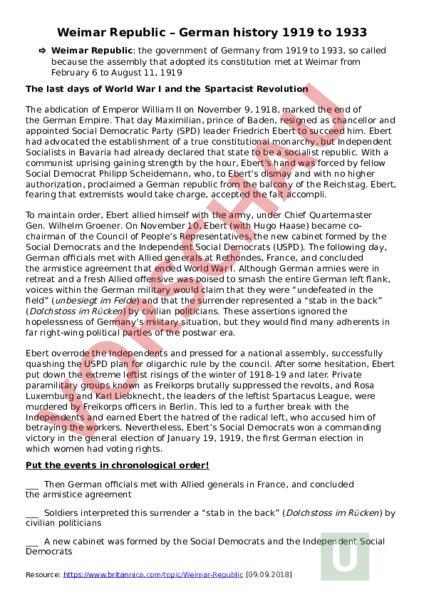Arbeitsblatt: The Weimar Republik
Material-Details
Arbeitsblatt plus Lösung
Geschichte
Politik
8. Schuljahr
2 Seiten
Statistik
183656
678
2
07.10.2018
Autor/in
Martina Zauner
Land: Österreich
Registriert vor 2006
Textauszüge aus dem Inhalt:
Weimar Republic – German history 1919 to 1933 Weimar Republic: the government of Germany from 1919 to 1933, so called because the assembly that adopted its constitution met at Weimar from February 6 to August 11, 1919 The last days of World War and the Spartacist Revolution The abdication of Emperor William II on November 9, 1918, marked the end of the German Empire. That day Maximilian, prince of Baden, resigned as chancellor and appointed Social Democratic Party (SPD) leader Friedrich Ebert to succeed him. Ebert had advocated the establishment of true constitutional monarchy, but Independent Socialists in Bavaria had already declared that state to be socialist republic. With communist uprising gaining strength by the hour, Eberts hand was forced by fellow Social Democrat Philipp Scheidemann, who, to Eberts dismay and with no higher authorization, proclaimed German republic from the balcony of the Reichstag. Ebert, fearing that extremists would take charge, accepted the fait accompli. To maintain order, Ebert allied himself with the army, under Chief Quartermaster Gen. Wilhelm Groener. On November 10, Ebert (with Hugo Haase) became cochairman of the Council of Peoples Representatives, the new cabinet formed by the Social Democrats and the Independent Social Democrats (USPD). The following day, German officials met with Allied generals at Rethondes, France, and concluded the armistice agreement that ended World War I. Although German armies were in retreat and fresh Allied offensive was poised to smash the entire German left flank, voices within the German military would claim that they were undefeated in the field (unbesiegt im Felde) and that the surrender represented stab in the back (Dolchstoss im Rücken) by civilian politicians. These assertions ignored the hopelessness of Germanys military situation, but they would find many adherents in far right-wing political parties of the postwar era. Ebert overrode the Independents and pressed for national assembly, successfully quashing the USPD plan for oligarchic rule by the council. After some hesitation, Ebert put down the extreme leftist risings of the winter of 1918–19 and later. Private paramilitary groups known as Freikorps brutally suppressed the revolts, and Rosa Luxemburg and Karl Liebknecht, the leaders of the leftist Spartacus League, were murdered by Freikorps officers in Berlin. This led to further break with the Independents and earned Ebert the hatred of the radical left, who accused him of betraying the workers. Nevertheless, Eberts Social Democrats won commanding victory in the general election of January 19, 1919, the first German election in which women had voting rights. Put the events in chronological order! Then German officials met with Allied generals in France, and concluded the armistice agreement Soldiers interpreted this surrender stab in the back (Dolchstoss im Rücken) by civilian politicians new cabinet was formed by the Social Democrats and the Independent Social Democrats Resource: [09.09.2018] 1 Abdication of Emperor William II in November 1918 marked the end of the German Empire Chancellor Friedrich Ebert accepted this situation even though he advocated the establishment of constitutional monarchy Social Democrat Philipp Scheidemann proclaimed the Republic from the balcony of the Reichstag Extreme leftist risings of the winter of 1918–19 were brutally put down and led to further break with the Independents Eberts Social Democrats were successful in the general election in January 1919 the first German election in which women had voting rights. Answer key: Put the events in chronological order! 1 Abdication of Emperor William II in November 1918 marked the end of the German Empire 2 Social Democrat Philipp Scheidemann proclaimed the Republic from the balcony of the Reichstag 3 Chancellor Friedrich Ebert accepted this situation even though he advocated the establishment of constitutional monarchy 4 new cabinet was formed by the Social Democrats and the Independent Social Democrats 5 Then German officials met with Allied generals in France, and concluded the armistice agreement 6 Soldiers interpreted this surrender stab in the back (Dolchstoss im Rücken) by civilian politicians 7 Extreme leftist risings of the winter of 1918–19 were brutally put down and led to further break with the Independents 8 Eberts Social Democrats were successful in the general election in January 1919 the first German election in which women had voting rights. Resource: [09.09.2018]
